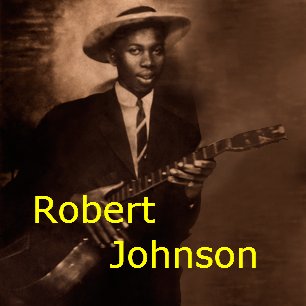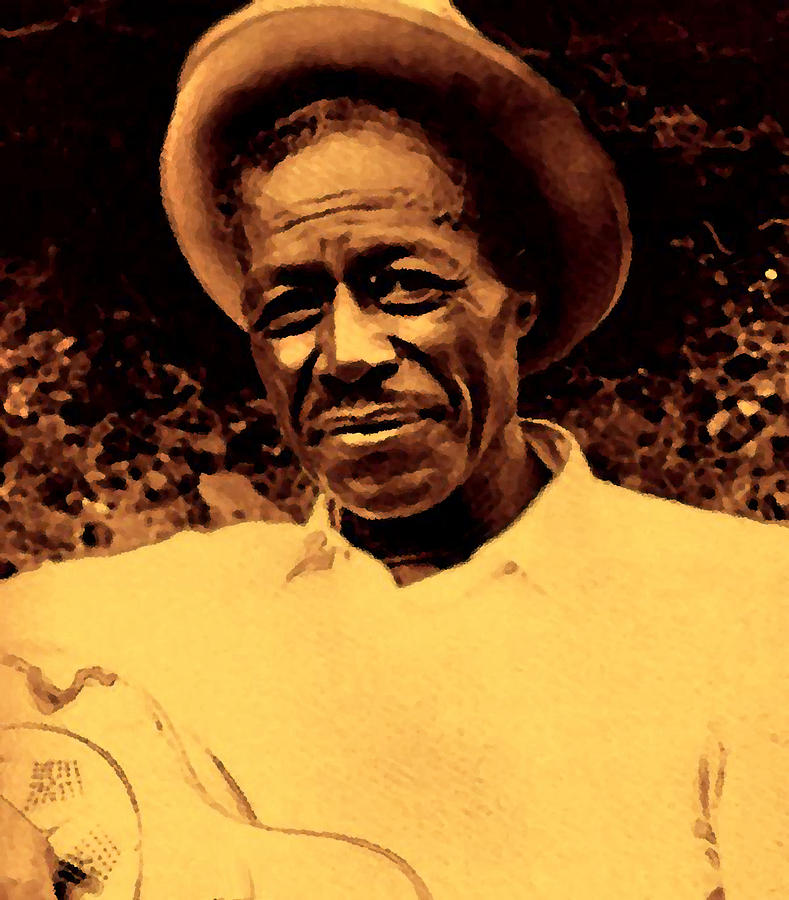Robert Leroy Johnson (May 8, 1911-- August 16, 1938) was an American blues singer and artist.
 Johnson was inducted into the Rock and Roll Hall of Fame as an "Early Influence" in their very first induction event in 1986. He was ranked 5th in Rolling Stone's list of 100 Greatest Guitarists of All Time.
Johnson was inducted into the Rock and Roll Hall of Fame as an "Early Influence" in their very first induction event in 1986. He was ranked 5th in Rolling Stone's list of 100 Greatest Guitarists of All Time.His landmark recordings from 1936-- 1937 show a special mix of singing, guitar abilities, and songwriting skill that have actually affected generations of artists. Johnson's shadowy, badly recorded life and death at age 27 have actually triggered much legend, consisting of a Faustian misconception.
Johnson's tunes, singing phrasing and guitar design have actually affected a broad variety of artists; Eric Clapton has actually called Johnson "the most crucial blues singer that ever lived".
Robert Johnson's Early life
Dodds had actually been required by a lynch mob to leave Hazlehurst following a conflict with white landowners. Julia herself left Hazlehurst with infant Robert, however after some 2 years, sent him to reside in Memphis with Dodds, who had actually altered his name to Charles Spencer.
Around 1919, Robert rejoined his mom in the location around Tunica and Robinsonville, Mississippi. Julia's brand-new other half was referred to as Dusty Willis; he was 24 years below she. Robert was kept in mind by some citizens as "Little Robert Dusty."
He was signed up at the Indian Creek School in Tunica as Robert Spencer. He is noted as Robert Spencer in the 1920 census with Will and Julia Willis in Lucas, Arkansas, where they lived for a brief time
Robert Johnson was born in Hazlehurst, Mississippi, most likely on May 8, 1911 or 1912, to Julia Major Dodds (born October 1874) and Noah Johnson (born December 1884). Julia was wed to Charles Dodds (born February 1865), a reasonably flourishing landowner and furnishings maker with whom she brought to life 10 kids.
Around 1919, Robert rejoined his mom in the location around Tunica and Robinsonville, Mississippi. Julia's brand-new spouse was understood as Dusty Willis; he was 24 years more youthful than she. Robert was kept in mind by some homeowners as "Little Robert Dusty."
THE NOTED BLUES MUSICIAN SON HOUSE MOVED TO ROBINSONVILLE WHERE HIS MUSICAL PARTNER, WILLIE BROWN, ALREADY LIVED. LATE IN LIFE,
 With a capability to get tunes in the beginning hearing, Johnson had no difficulty providing his audiences exactly what they desired, and specific of his contemporaries later on mentioned on Johnson's interest in jazz and nation. Johnson likewise had a remarkable capability to develop a relationship with his audience-- in every town where he stopped, Johnson would develop ties to the regional neighborhood that would serve him well when he went through once again a year or a month later on.
With a capability to get tunes in the beginning hearing, Johnson had no difficulty providing his audiences exactly what they desired, and specific of his contemporaries later on mentioned on Johnson's interest in jazz and nation. Johnson likewise had a remarkable capability to develop a relationship with his audience-- in every town where he stopped, Johnson would develop ties to the regional neighborhood that would serve him well when he went through once again a year or a month later on.CARRYING OUT CAREER
He would play for pointers on street corners or in front of the regional hair salon or a dining establishment when Johnson showed up in a brand-new town. Musical partners specified that in live efficiencies Johnson typically did not concentrate on his complicated and dark initial structures, however rather happy audiences by carrying out more popular pop requirements of the day-- and not always blues.
When House moved to Robinsonville in 1930, Johnson was a young adult, currently wed and widowed. Johnson then left the Robinsonville location, coming back after a couple of months with an amazing guitar method.
From this base Johnson started taking a trip up and down the Delta as a travelling artist.
When he satisfied Johnson in 1933, Fellow artist Johnny Shines was 17. He approximated that Johnson was perhaps a year older than himself. In Samuel Charters' Robert Johnson, the author prices estimate Shines as stating:
Johnson apparently asked homely girls residing in the nation with their households whether he might go house with them, and for the most parts the response was 'yes'-- till a sweetheart showed up or Johnson was all set to proceed.
Robert 'd be standing up playing some location, playing like no one's service. Robert 'd simply pick up and stroll off and leave you standing there playing. And you would not see Robert no more possibly in 2 or 3 weeks ... So Robert and I, we started travelling off.
Throughout this time Johnson developed exactly what would be a fairly long-lasting relationship with Estella Coleman, a female who had to do with fifteen years his older and the mom of artist Robert Lockwood, Jr. Johnson apparently cultivated a lady to look after him in each town he played in.
His very first tape-recorded tune, "Kind Hearted Woman Blues", became part of a cycle of spin-offs and reaction tunes that started with Leroy Carr's "Mean Mistreater Mama" (1934). Inning accordance with Wald, it was "the most musically complicated in the cycle and differed from the majority of rural blues as a through-composed lyric, instead of an approximate collection of more-or-less unassociated verses.
By the time he passed away, a minimum of 6 of his records had actually been launched in the South as race records.
Due to the fact that Johnson did 2 takes of a lot of tunes throughout these sessions, and recordings of those takes made it through, more chance exists to compare various efficiencies of a single tune by Johnson than for other blues entertainer of his time and location.
In contrast to most Delta players, Johnson had actually soaked up the concept of fitting a made up tune into the 3 minutes of a 78 RPM side. The majority of Johnson's "reflective and mournful" efficiencies and tunes originate from his 2nd recording session.
This has actually been pointed out as proof he was a shy male and reserved entertainer, a conclusion highlighted in the incorrect liner notes of the 1961 album King of the Delta Blues Singers. In the taking place three-day session, Johnson played sixteen choices, and taped alternate considers the majority of these.
In 1937, Johnson took a trip to Dallas, Texas, for another recording session in a makeshift studio at the Brunswick Record Building, 508 Park Avenue. Eleven records from this session would be launched within the list below year.
In 1938, Columbia Records manufacturer John H. Hammond, who owned a few of Johnson's records, sought him out to book him for the very first "From Spirituals to Swing" show at Carnegie Hall in New York. On knowing of Johnson's death, Hammond changed him with Big Bill Broonzy, however still played 2 of Johnson's records from the phase. It was rumored that Muddy Waters was also being considered, but wasn't as well-known at that time.
In the in 2015 of his life, Johnson is thought to have actually taken a trip to St. Louis and perhaps Illinois, and after that to some states in the East. He invested a long time in Memphis and took a trip through the Mississippi Delta and Arkansas.
Amongst the tunes Johnson taped in San Antonio were "Come On In My Kitchen", "Kind Hearted Woman Blues", "I Believe I'll Dust My Broom" and "Cross Road Blues". The very first tunes to appear were "Terraplane Blues" and "Last Fair Deal Gone Down", most likely the only recordings of his that he would live to hear. "Terraplane Blues" ended up being a moderate local hit, offering 5,000 copies. Unlike Big Bill Broonzy, he never sold many records in his lifetime.
In 1941, Alan Lomax gained from Muddy Waters that Johnson had actually carried out in the Clarksdale, Mississippi location. By 1959, Samuel Charters might just include that Will Shade of the Memphis Jug Band kept in mind Johnson had actually as soon as quickly had fun with him in West Memphis, Arkansas.
RECORDING SESSIONS - MAIN ARTICLE: ROBERT JOHNSON'S RECORDING SESSIONS
Around 1936, Johnson looked for H. C. Speir in Jackson, Mississippi, who doubled and ran a basic shop as a skill scout. Speir put Johnson in touch with Ernie Oertle, who provided to tape-record the young artist in San Antonio, Texas. At the recording session, held November 23, 1936 in space 414 at the Gunter Hotel in San Antonio which Brunswick Records had actually established as a short-lived studio, Johnson apparently carried out dealing with the wall.
Fellow artist Johnny Shines was 17 when he satisfied Johnson in 1933. In Samuel Charters' Robert Johnson, the author prices estimate Shines as stating:
Speir put Johnson in touch with Ernie Oertle, who provided to tape the young artist in San Antonio, Texas. At the recording session, held November 23, 1936 in space 414 at the Gunter Hotel in San Antonio which Brunswick Records had actually set up as a short-term studio, Johnson supposedly carried out dealing with the wall.
Amongst the tunes Johnson tape-recorded in San Antonio were "Come On In My Kitchen", "Kind Hearted Woman Blues", "I Believe I'll Dust My Broom" and "Cross Road Blues".